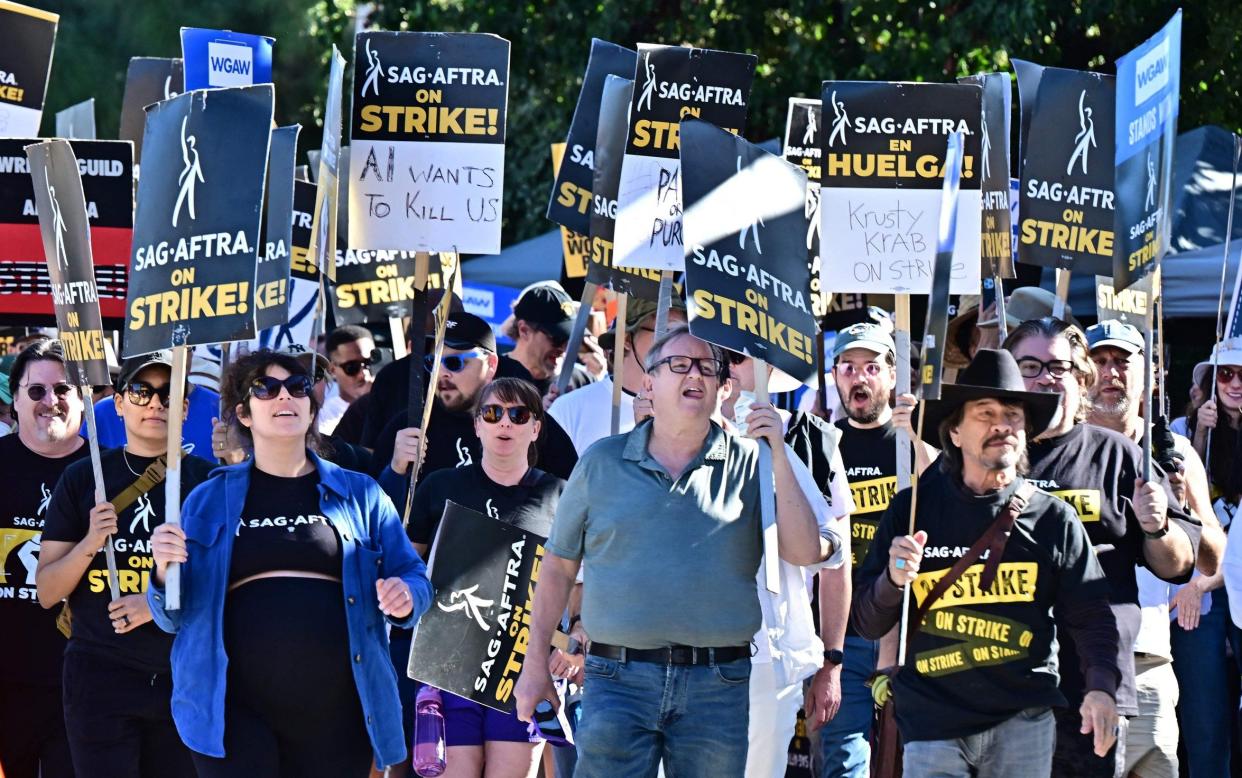‘It’ll be a locking of horns’: Why deepfakes threaten to bring movieland to a standstill

“I’ve never done a f-----g animal impersonation in my life, and I wouldn’t know where to f-----g begin,” the actor Brian Cox said as he recounted the time he was asked to help create an artificial intelligence (AI) version of himself.
The expletive-laden outburst – worthy of Logan Roy, the tyrannical media patriarch Cox plays in the HBO drama Succession – formed part of a broadside against AI delivered at the height of the Hollywood strikes last summer.
A year on, his concerns are finally being heard. Equity, the actors’ union, has begun negotiations with producers that will govern contracts overseeing the vast majority of UK films and TV shows.
At the heart of the discussions are demands for guarantees over the use of AI amid fears it could be used to mimic actors’ image and likeness, while the union is also calling for fairer pay in the streaming era.
The demands raise the prospect of more walkouts after Hollywood was brought to a standstill last summer. But as broadcasters and the UK production sector emerge from the deepest advertising downturn since the financial crisis, can they afford another setback?

For the denizens of Hollywood, the strikes were a historic moment. Members of the SAG-AFTRA union, which represents US actors, walked out for more than 100 days amid a major dispute with studios.
With the Writers Guild of America also on strike, it was the first joint walkout since 1960 and effectively shut down production activity in the US.
The ripple effects were felt in Britain too, as high-profile figures including Imelda Staunton, Penelope Wilton and Simon Pegg joined Cox at a demonstration in Leicester Square.
Equity, which was closely involved in the discussions in Los Angeles, is now at the negotiating table with Pact, the industry body representing UK production companies.
The most headline-grabbing of Equity’s demands revolves around AI, as actors seek to head off the threat from the nascent technology.
Deep Fake Neighbour Wars, an ITV series featuring AI-generated avatars of celebrities including Idris Elba and Kim Kardashian, sparked concerns among actors last year.
In a sign of how quickly the technology is developing, the first film written entirely by ChatGPT has now arrived. Titled The Last Screenwriter, it prompted such a backlash that the Prince Charles Cinema in Soho was forced to cancel the world premiere last month.

Equity, which has previously criticised the Government for failing to clamp down on AI, plans to use the negotiations with Pact to secure protection for actors from technology that could be used to clone their image or voice.
AI is also top of the agenda in separate negotiations with the BBC and ITV, which focus largely on protections for soap operas such as Coronation Street and EastEnders.
“What we’re keen to do in these negotiations is break down AI from this scary, 60s, sci-fi concept into a series of technologies that have a meaningful impact on our members,” says Paul Fleming, general secretary of Equity.
“There’s a lot of hysteria and fear about AI, and it’s a subject that’s important to take seriously and deal with carefully, but breaking it down area by area is the most satisfactory way to do it in our opinion.”
Fiona Orford-Williams, an analyst at Edison Group, adds: “Nobody’s pretending that AI is not going to be used. It’s going to be used for all sorts of stuff and we need to acknowledge that and get proper fair terms for everybody.”
In addition to AI, Equity is pushing for increases in both minimum fees and so-called “residuals”, which allow actors to earn additional money when their film or TV show reruns – a key concern in the streaming era. This is expected to be one of the major sticking points in negotiations.
Other demands include tighter regulation of casting processes and a crackdown on so-called “special stipulations”, frequently used by US broadcasters and streaming platforms, that impose additional demands on actors.
Equity’s demands raise the spectre of a walkout by actors that would mirror last year’s Hollywood chaos.
“They [SAG-AFTRA] got very impressive wins by having to take very impressive and sustained action,” says Fleming.
“For the first time in a generation, Equity is capable and prepared to do that. It’s a tool in our armoury.”

Orford-Williams adds: “The people who are going to have to fund this are going to dig their heels in, but they know the current way of doing things just isn’t equitable.
“It’s going to be a locking of horns.”
Equity insists that talks are going well so far, and the two sides are meeting every fortnight with the aim of reaching an agreement by the end of September. Pact declined to comment beyond confirming the talks.
Yet all parties know the negotiations have fallen at a critical time for Britain’s film and TV industry.
Broadcasters are still reeling from the impact of last year’s strikes, with ITV warning that around £80m in revenues for its production division will be pushed back from 2024 to 2025.
Speaking to MPs earlier this year, John McVay, the head of Pact, said: “If America sneezes, we often catch a cold when it comes to things like strikes.”
Commercial broadcasters such as ITV and Channel 4 are also only just starting to emerge from the biggest advertising downturn since the financial crisis, which sparked hundreds of job losses.
So as the industry teeters on the brink of recovery, a large walkout by actors would be a crippling setback. As a result, the union may have picked the ideal time to pounce.
“We’re starting from a real high point ... We’re riding on the back of a good agreement in the US and we’re very, very prepared for it,” says Fleming.
“I think the bosses know that.”
